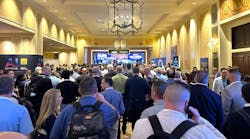If you're like most Americans who aren't involved in politics, the entire political circus can seem a bit unreasonable at times.
On the one hand (and in the "reasonable and fair category"), we wrote earlier this week about what's happening with the Secure America's Homes and Businesses Act. This is the bill in Congress that has netted a pretty good deal of support for providing tax deductions to home and business owners who install security systems in their facilities. NBFAA's John Chwat, a lobbyist who handles the association's government relations chatted with SecurityInfoWatch.com to give a quick update on the status of that legislation. He also noted that there have been a number of bills promoting fire suppression, and that the NBFAA is working to make sponsors know that promoting fire detection needs to be just as big a part as promotion of fire suppression requirements.
Then you've got lots of city ordinances popping up that are creating fine systems for false alarms -- no surprise there, really. It seems that everyone in the industry agrees that false alarms don't do anyone a bit of good and that alarm owners need to have some sort of incentive to keep their false alarm numbers down. Happening this week: Durham and Charlotte, N.C.; Medford, Ore., Alton, N.H., Plainfield Township, Mich., and others (see our Legislation page).
And then there's Dallas. The city is considering non-response or verified response, whichever you want to call it. Sometimes, like in Fremont, Calif., stripped budgets simply don't allow for responding to unverified alarm signals. Dire circumstances require, unfortunately, dire responses. But not so in Dallas, where a permitting and fine structure would seem to make up for the amount the city expends on responding to calls. But the city is pushing forward with this non-response policy.
What's unbelievable, as it was demonstrated in The Dallas Morning News and cross-posted on our site, is that the City Council spent almost $4,000 to create and print brochures which encourage citizens to lobby that same City Council in support of the non-response policy. Yes, that's right, the city council is spending the public's own money to change the public's opinion of a policy that many city residents have come out openly against. Something just doesn't add up...so see our earlier note about politics and utter confusion. Even the town's mayor was shocked that the council had pulled such a stunt.
Onward and upward, let's, for a moment, leave this never-ceasing issue of alarm response alone for now. Back in Fulton County, Ga. (home of Atlanta and home for some SIW staffers), the fall-out has continued from the murders that occurred at the county's courthouse. The widow of the judge murdered there has sued the Sheriff's department, alleging fault over the fact that the surveillance cameras were not being monitored live and alleging that not enough guarding of the prisoner was being provided. It's not my place to comment on whether those cameras should have been monitored or whether I think there were enough guards (some say that those considerations are pretty evident in this case), but what I want to point out is that you're seeing broad issues of liability in how you use your security system. Does owning a surveillance system mean your company should have it monitored at all times? Does having guards on staff mean you're liable if a guard fails to prevent a crime? These are heady concerns for security directors, and I encourage you to discuss these concerns in our forum area for security directors.
I'll give you PSPs and CPPs something else to think about in the form of this news story about an ABC investigative report on nuclear security. In this story, some ABC interns went undercover to investigate security at nuclear facilites on college campuses. I just want to bring this up to point out that your security is going to be assessed, whether by the bad guys, by the government of by some eager reporters.
We all use security products, and the world of security systems manufacturers seems to grow more interconnected by the day. Of note this week: IPIX partnered with Panasonic for surveillance offerings, and GE and Mitsubishi are working together for a container security initiative.
Quickly, here's what else has been happening: A new market update is available for the CCTV industry from Research and Markets; the Smart Card Alliance has been at its annual conference discussing access control issues among other concerns, and integration firm Henry Bros. bought up Denver-based integrator Securus.
Next week, Security Technology & Design's Steve Lasky and I will be heading to Seattle to participate in the SecureWorld Expo, which has become a great think tank for facing issues that todays CSOs and CISOs are facing. Do join us if you're in the area; click over to the Secure World Expo website to learn more.
Finally, a look at our top stories of the week.

